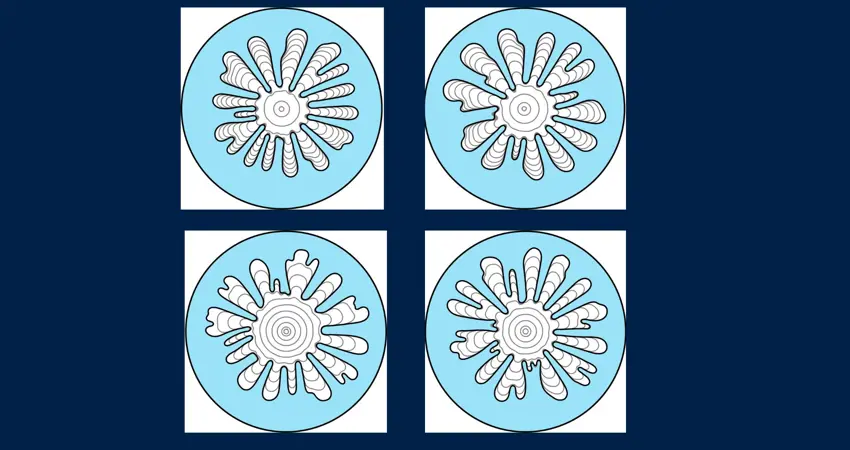23 Oct 2024
François Frenkiel Award for Fluid Mechanics for Professor Chris MacMinn and Postdoctoral Researchers
Paper describes how altering compressibility could control ‘viscous fingering’ , with implications for flow in fuel cells and during CO2 sequestration and the remediation of groundwater contamination

Clockwise from top left: As gas is made more compressible (using a larger syringe), the instability is delayed and more liquid is pushed out of the cell
Professor Chris MacMinn and Postdoctoral Researchers Dr Callum Cuttle and Dr Liam Morrow have been selected by the American Physical Society (APS) as this year’s winners of the François Frenkiel Award for Fluid Mechanics. Their paper "Compression-driven viscous fingering in a radial Hele-Shaw cell” was selected from 33 evaluated for the award.
The displacement of a viscous liquid by a gas has been studied for decades. When gas is forced into a liquid-filled reservoir, the gas-liquid interface is unstable, with the gas pushing slender ‘fingers’ into the liquid. The ability to control this ‘viscous fingering’ phenomenon could be used to improve the efficiency or effectiveness of processes where it occurs, including within fuel cells, during the underground sequestration of CO2, and during the remediation of groundwater contamination. The Oxford researchers have uncovered a new way to control the time it takes for this instability to appear using gas compressibility as the control parameter.
“Viscous fingering can be either good or bad, depending on the situation,” says Professor MacMinn. “Fingering is famously undesirable in enhanced oil recovery, where the fingers reduce the efficiency of the displacement process. But in CO2 sequestration in saline aquifers, fingering may increase the interfacial area between CO2 and water and accelerate the trapping of the CO2, which would be beneficial.”
The researchers injected air through a syringe into a thin layer of silicone oil confined between two circular glass plates. They varied the compressibility of the gas by changing the size of the syringe (and therefore the initial volume of gas). By analyzing the expanding gas-liquid displacement front, the researchers found that the onset of fingering could be delayed by making the gas more compressible.
“We found that gas compression can have a strong but subtle impact on gas-driven displacement processes. Our results could be used to enhance or suppress fingering by tuning the strength of compressibility”, Dr Cuttle says.
Professor MacMinn leads the Poromechanics Laboratory at Oxford, an interdisciplinary team of engineers, physicists, mathematicians, and earth scientists. They use mathematical modelling, numerical simulations, and high-resolution laboratory experiments to study flow, transport, and deformation in porous media and other multiphase systems for applications in subsurface science and engineering, soft materials, and biology and medicine.
In selecting the winning paper, the judges particularly noted the team’s identification of the striking role of gas compressibility in Hele-Shaw flow and the remarkable combination of different approaches they brought to the problem. The award will be presented in November at the 2024 Annual Meeting of the APS Division of Fluid Dynamics in Salt Lake City, Utah, USA.
The bubble (the pale region with a red outline) grows much slower when the gas is more compressible (right hand experiment), which changes the features of the fingering pattern.
Experiments @ injection rate Q=5ml/min with initial gas volume 25ml (L) and 200ml (R)




